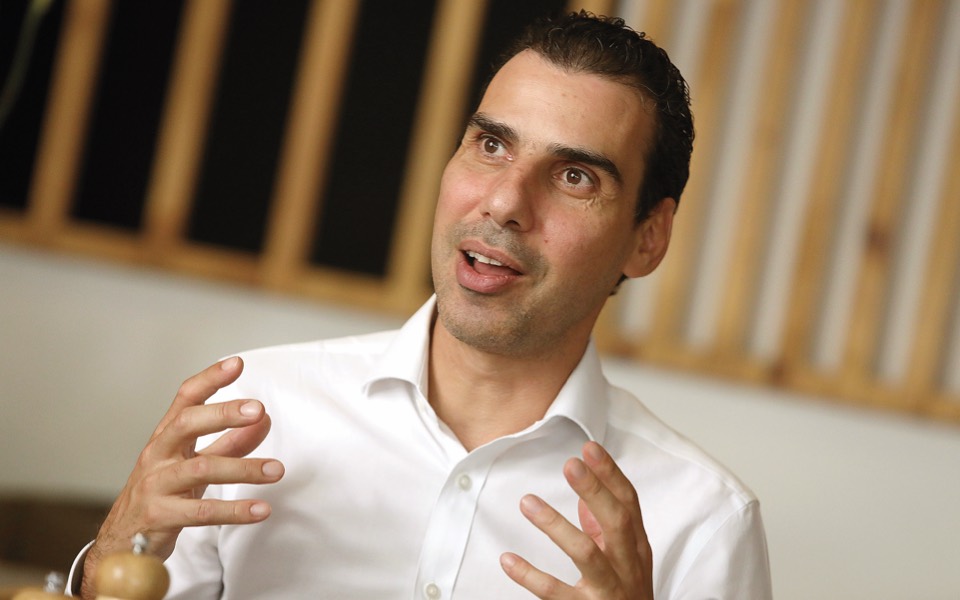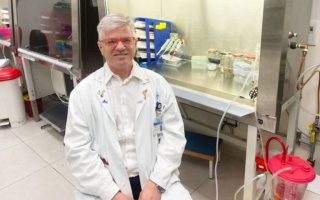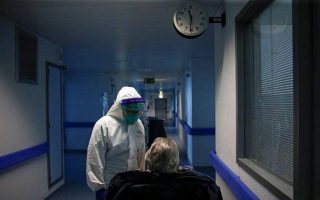‘We had to treat it like a military campaign,’ says the designer of Greece’s vaccination program

The first question I ask Marios Themistokleous as we sit down for our interview is how he decided to get involved in the toughest operation being run by the Greek state right now.
The Health Ministry’s general secretary of primary healthcare – a neurosurgeon and father of three – laughs. Life, he says, has become somewhat “one-track” in the past few months.
The son of mathematicians, he learned to love the science as a child and has won all sorts of regional and international competitions. Even though he had not fully grasped the extent of his latest undertaking, he was eager to take it on.
“I realized just how huge it was within a week of being assigned the project. I thought, ‘This isn’t something we can tackle with traditional means.’ We had to treat it like a military operation,” he recalls. This is what he told Health Minister Vassilis Kikilias, who supported the plan, before throwing himself into the task of designing Greece’s mass Covid-19 vaccination program.
It was an unprecedented undertaking, and one in which a lot of basic factors were missing. “The refrigerators for the very low temperatures required by the Pfizer vaccine, for example. Then, we had initially estimated a rate of around 2 million vaccinations a month, which is how we came up with 1,018 vaccination centers. With that number, we basically started building the structure of the vaccination plan, which no one at the time thought possible or had any faith in. What was the unknown factor in the plan? The vaccines. We only had a rough idea of how many vaccines the companies would deliver,” he says. As it turns out, even the companies themselves weren’t sure.
Themistokleous got to work and designed the plan, dubbed “Eleftheria” (Operation Freedom) by the government, in a brief document. It wasn’t something that had already been done on a smaller scale and just needed to be supersized. It also had to be kept simple.
“I personally go crazy when I hear a lot of unknown and complicated solutions to a problem that in practice become the cause of failure rather than success,” he comments.
The plan was fine-tuned in cooperation with the National Vaccination Committee, with its president, Maria Theodoridou, describing it as being “scientifically sound” and containing the necessary know-how and moderation.
Themistokleous notes that the people implementing the plan were lucky because three or four of the initial hurdles were overcome quickly. The problem with the refrigerators for temperatures of -80 degrees Celsius was solved thanks to donations made by private companies. “That really freed us, because how can you put something to tender when you can’t even describe what it is exactly?” he says.
The next step was to get in touch with the Digital Governance Ministry, which he describes as “a team of excellent scientists and technicians,” who became his friends over time. “We designed and implemented an end-to-end process that was completely digitalized, spending a few very difficult nights until we could get it done. There was also the matter of supply, which is massive, even though it may not appear so.”
Themistokelous explains that the vaccine supply system was designed in cooperation with the ministry and the president of the Institute of Pharmaceutical Research and Technology, a subsidiary of the National Organization for Medicines, and its president, Dimitris Pantazis. The military was also brought in because it was the only body with the necessary know-how.
“You need people who understand logistics – that we need that many vaccines to get to those centers in X amount of time,” he says.
“Control,” where all the different strands of information and data come together, is at the General Secretariat for Civil Protection, so that all the different players involved in the campaign can, at any given moment, have a “real-time picture of the course of vaccinations nationwide and be able to redesign, adapt and modify.”
HQ is an open space in the secretariat’s building in the northern Athens suburb of Maroussi, explains Themistokleous. It is also where the organizing committee met. “We’d gather there at 7 p.m., every day, regardless of holidays or weekends, for the first few months,” he says, adding that these meetings were attended by all the relevant government officials. “Every issue needed to be addressed without delay,” he stresses.
The next challenge was organizing the immunization of healthcare workers. There was some hesitation to begin with because of the unprecedented nature of the whole thing, says Themistokleous, adding that “the climate changed entirely when the first elderly citizens started going to the vaccination hubs.” These hubs, he says, were a ray of “optimism in the gloom.”
“It’s like births in hospitals. Births are one of the few things that bring joy in a hospital. The vaccines gave birth to hope and this was a joy after many months of sadness,” he says, going on to express his heartfelt thanks to every person on the frontlines of Operation Freedom.
Asked about when Greece’s supply of vaccines will outstrip demand, Themistokleous says it will depend on deliveries from Pfizer/BioNTech in the last quarter of the year. He also says that some of the differences between European Union member-states are due to the different absorption rates of the AstraZeneca jab, while noting that deliveries of the Johnson & Johnson shots have not stabilized yet. “We can carry out 125,000 to 130,000 vaccines a day with the centers we have at present. If Johnson suddenly sent us a big volume of vaccines, we could transfer capacity where it’s needed to get those vaccines done,” he says.
Themistokleous says that the noise about the AstraZeneca shot also had an adverse effect on the uptake of the other vaccines. “First off, just a handful of incidents were reported from 1.1 million vaccinations,” he says, defending the shot developed at Oxford University in the United Kingdom. He adds that the vaccination committee’s decision to restrict the age groups receiving the AZ jab was driven by a drop in Covid-19 transmission rates. This, he said, could change again.
“The [age] limits may be revised again, down to younger ages. This has already happened in most European Union countries,” he says.
In a bid to tackle vaccine hesitancy, Themistokleous has reached out to mayors and other community officials in parts of Greece were take-up rates have been sluggish.
“If someone from any part of Greece asks me to send this many vaccines right now because they don’t have enough, I’ll be sending them tomorrow,” he says.
Asked about the target of 70% nationwide vaccination coverage to achieve a “wall of immunity,” Themistokleous says that he is confident the rate will be accomplished in the over-60s categories, who are also at greater risk of hospitalization and death. “It’s going to take a lot of work in the younger age groups but the rate will gradually increase. I estimate that we’ll come out of the summer at a rate of 60-70%.
Themistokleous adds that one of the plans to speed up vaccinations is to create centers that do not require appointments, within the fall.
“It’s a huge project, but also very exciting, and I would like to say – not out of obligation, either – a big thank you to the prime minister for entrusting me with such an endeavor,” says the official.





